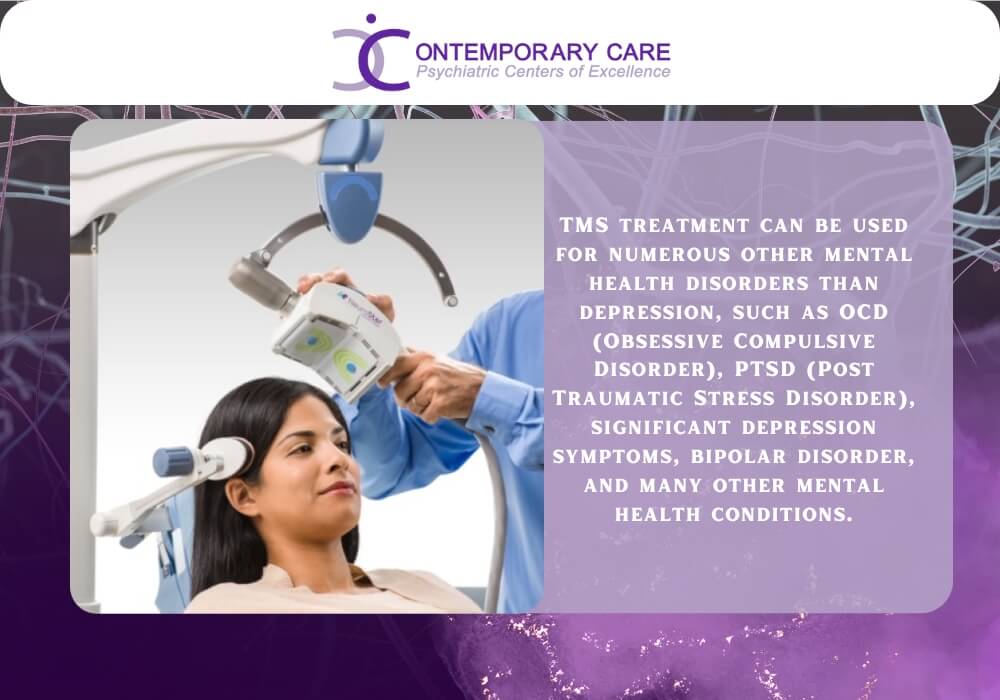TMS treatment for anxiety is an innovative approach to treating generalized anxiety disorder.
Anxiety is a feeling of uneasiness and worry, usually generalized and unfocused as an overreaction to a situation that is only subjectively seen as menacing. The emotion of anxiety can persist beyond the developmentally suitable time in response to specific events. Thus turning into one of the multiple anxiety disorders (e.g., generalized anxiety disorder, panic disorder.
What is Anxiety disorder?
Anxiety is an emotion that is characterized by an unpleasant state of inner turmoil and includes feelings of dread over anticipated events.
Anxious thoughts or beliefs that are hard to control. They make you feel restless and tense and interfere with your daily life. They do not go away and can get worse over time. Physical symptoms include:
- A pounding or rapid heartbeat.
- Unexplained aches and pains.
- Dizziness.
- Shortness of breath.
Symptoms of anxiety disorders include:
- Trouble concentrating or making decisions.
- Feeling irritable, tense, or restless.
- Experiencing nausea or abdominal distress.
- Having heart palpitations.
- Sweating, trembling, or shaking.
- Trouble sleeping.
- Having a feeling of upcoming danger, panic, or destruction.
What is TMS?
Transcranial magnetic stimulation (TMS) is a procedure that helps treat certain treatment-resistant mental health conditions.
Transcranial magnetic stimulation (TMS) is a noninvasive form of brain stimulation. A changing magnetic field is used to induce an electric current at a specific brain area through electromagnetic induction. An electric pulse generator, or stimulator, is connected to a magnetic coil connected to the scalp. The stimulator generates a changing electric current within the coil, which creates a varying magnetic field and induces a current within a region in the brain itself.
Types Of Brain Stimulation Therapies:
Deep transcranial magnetic stimulation
Repetitive transcranial magnetic stimulation (rTMS)
Who Can Benefit From TMS?
TMS treatment can be used for numerous other mental health disorders than depression, such as OCD (Obsessive Compulsive Disorder), PTSD (Post Traumatic Stress Disorder), significant depression symptoms, bipolar disorder, and many other mental health conditions.
Who should avoid TMS?
Factors that can disqualify you from TMS therapy include:
- History of neurological conditions, such as seizure or epilepsy
- Pregnancy or nursing
- Brain illness
- Traumatic brain injury
- Brain tumor or stroke
- Patients who have metal in their head or neck
Is TMS for Anxiety Effective?
There is no doubt that TMS therapy can help reduce symptoms of a variety of different anxiety disorders. But how?
We are well aware that TMS therapy has been highly effective in treating treatment-resistant depression, but do the same advantages exist for someone with anxiety? In short, yes. Let’s first take a look at what types of symptoms those with anxiety disorders experience:
- Experiencing a regular sense of impending doom/danger
- Sweating
- Trembling
- Shaking
- Gastrointestinal problems
- Excessive worry
- Avoiding things that trigger anxiety
- Problems controlling worries
- Difficulty thinking of anything but the present worry
- Sleep problems
- Increased heart rate
- Heavy respiratory rate
How Effective is TMS Therapy for Anxiety?
Living with an anxiety disorder can be as awful as not living at all. These and other accompanying symptoms of a patient with anxiety can wash over them in overwhelming waves and forbid them from being productive in their lives. However, all these symptoms can be eliminated, at least partly, with the appropriate treatment. And TMS is one of the therapies that can help.
Studies have shown that the patients diagnosed with an anxiety disorder who underwent the TMS for anxiety have reported the following symptoms decrease:
- Restlessness
- Sleep problem
- Irritability
- Frequent urination
- Shortness of breath
- Blurred vision
- Muscle tension
- Excessive sweating
- Problems concentrating
- Digestion problems
- Headaches
- High blood pressure
How Long Will TMS for Anxiety Show Results?
TMS therapy for anxiety usually takes a few weeks before results are noticeable. It varies for each person, just as results vary with other treatment types. While some people might experience the benefits of the treatment only after two weeks, others require four or five weeks to notice improvements.
What to Expect in the First Few Sessions?
TMS is an outpatient clinic procedure. The patient is fully awake and alert during the entire procedure, as no sedation or anesthesia is needed.
- During the session, the patient is recommended items like music, a film, or a TV show. They can also talk to a nurse or doctor.
- The patient will only feel tapping sensations, usually around the front of the head along the hairline.
- Each session lasts 30 to 40 minutes, depending on the protocol.
- Patients can also resume their usual daily activities immediately after the session.
What is the Average Success Rate of TMS Therapy for Anxiety?
Most patients considering TMS for anxiety have concerns about the chances of success and what should be expected of them while using the procedure. Based on the data available from most TMS providers, the success rate stands between 70% and 80%, meaning that most people who undergo treatment experience relief after the treatment.
Signs That TMS Therapy for Anxiety Is Working
The initial signs that TMS is relieving anxiety symptoms will vary from patient to patient. The signs may start small, but the results can be life-improving at the end of a treatment plan.
Common signs of improvement include:
- Return of Sense of humor in daily life.
- Improve the ability to manage and accomplish daily tasks that are important to life.
- Brighter and more hopeful overall mood.
- Being more present and the ability to be in the moment.
- Activities and hobbies become enjoyable, or discovering new things that bring joy.
- Increased amount of energy in daily life.
What Are the Side Effects Of TMS Therapy for Anxiety?
Although TMS for anxiety is a relatively safe and effective treatment, it has side effects, too.
The most common side effects include:
- Mild headaches
- Scalp discomfort
- Lightheadedness
- Scalp and neck pain
- Tingling
- Spasms
- Sleepiness
- Altered cognition during treatment
However, side effects like headaches disappear after the first few TMS sessions.
Some rare side effects have been reported with TMS, such as:
- Seizure (usually grand mal seizure)
- Mania
- Hypomania
- Auditory or visual hallucinations
If you experience rare side effects, contact your TMS provider immediately. The chance of experiencing these side effects is at 0.1%.

What are the Benefits of TMS Therapy for Anxiety?
1. Noninvasive: TMS therapy is FDA-approved brain stimulation that is noninvasive and less invasive than traditional antidepressants and other treatments.
2. Drug-Free: Safe to use with other medications, without side effects associated with traditional antidepressants.
3. Effective in Treatment-Resistant Depression: Offers an alternative for patients unresponsive to antidepressant medications or treatments.
4. Minimal Side Effects: TMS for anxiety causes fewer side effects than other mental disorder treatments.
5. Long-Lasting Results: It shows long-term improvements in most patients.
6. Reduced Dependency on Medications: No retreat symptoms or dependence risk.
7. Mood Improvement: Boosts specific brain areas to improve mood and energy levels.
8. Expansive Treatment Range: Useful for various mental health disorders.
9. No Memory Issues: Unlike ECT, TMS for anxiety does not negatively impact memory. It may even enhance cognitive ability.
10. Covered By Insurance: Recognized by most insurance companies as necessary for treatment.
FAQs
Can TMS worsen anxiety?
There is no evidence suggesting TMS can worsen anxiety, but people may experience some mild to moderate side effects like headache, scalp pain, facial twitch etc.
How successful is TMS for anxiety?
TMS (Transcranial Magnetic Stimulation) has shown promising success in treating anxiety, with studies indicating a success rate of around 50-60%. Many patients experience significant reductions in symptoms, while some achieve long-term relief. However, effectiveness varies, and it’s important to consult a healthcare provider to determine if TMS is suitable for you.
How many times can you do TMS therapy?
There is no strict limit to how many times you can do TMS therapy. Typically, an initial course consists of 20-30 sessions over several weeks. If symptoms return, some patients may undergo additional “maintenance” sessions or repeat the treatment later. It’s best to consult your doctor to personalize the frequency based on your needs and response.
Has TMS been approved for anxiety?
TMS received approval from the FDA in 2008 as an alternative therapy for Major Depressive Disorder. It has also been demonstrated to reduce symptoms of conditions like Post-Traumatic Stress Disorder (PTSD), Obsessive-Compulsive Disorder (OCD), and various Anxiety Disorders.
Who Should Avoid TMS?
TMS therapy should be avoided by individuals with metal implants or devices in or around the head, such as aneurysm clips, stents, or pacemakers, as the magnetic fields could interfere with these devices. It’s also not recommended for those with a history of seizures, epilepsy, or certain neurological conditions. Always consult with a healthcare professional to determine if TMS is safe for you.
Contemporary Care Psychiatric Centers of Excellence: Leaders in TMS Therapy
Contemporary Care Psychiatric Centers of Excellence offers the highest standard of care backed by decades of research and experience.
At the forefront of TMS therapy, Contemporary Care Psychiatric Centers of Excellence is led by the renowned Dr. Tarique Perera, a world expert on TMS and the founding president of the Clinical TMS Society. With over 1500 members in 45 countries, this society is the global authority on TMS practices. Dr. Perera is also the first author of the TMS Guidelines, which are followed worldwide, ensuring that our practices reflect the highest standards of care.
Why Choose Contemporary Care for TMS Therapy?
We can provide you with safe and efficient TMS therapy. With more than five years of experience and thousands of patients treated, our team has delivered TMS treatment to people of all ages, from six to over a hundred. Our specialized treatment approach also ensures that pregnant women can benefit from TMS without risk.
At Contemporary Care, we treat not only depression and OCD but also other complex conditions like:
- Generalized Anxiety Disorder (GAD)
- Post-Traumatic Stress Disorder (PTSD)
- Chronic Pain and Fibromyalgia
- Autism and Schizophrenia
- Parkinson’s and Alzheimer’s Disorders
We are one of the few clinics offering Neurostar and Magventure devices, ensuring flexibility in treatment options. Our ability to provide Theta Burst TMS and specialized OCD coils means we can achieve exceptional results for even the most challenging cases.
Proven Expertise and Personalized Care
Dr. Perera’s research has demonstrated that standard TMS is just as effective as so-called ‘deep TMS,’ with fewer side effects. Neurostar and Magventure treatments stimulate deeper brain regions like the hippocampus and amygdala, promoting neurogenesis and long-term improvements in mental health. That’s why we have such excellent results for our patients.
If you’re considering TMS therapy for depression, anxiety, OCD, or other conditions,
Call us to find out more and take the first step to a healthy, happy life from today!



